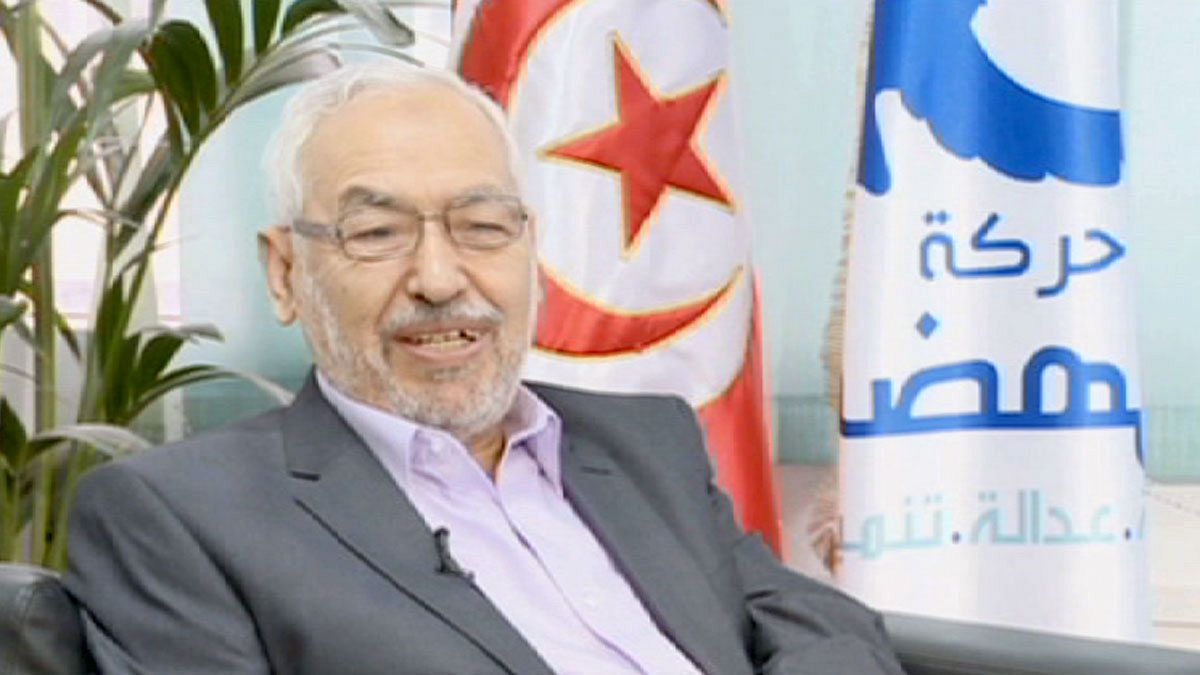After the Jasmine revolution in Tunisia just what has been accomplished in the political, economic and social spheres by the Ennaahda party. The winners of the country’s first post revolution democratic election.
Adell Dellal, euronews: “Mr Rashed Ghannoushi leader of the Ennahdha party, welcome to euronews.”
Rashed Al Ghannouchi: “Hello.”
Adell Dellal, euronews: “Ennahdha’s current policies are considered by many in Tunisia and abroad to threaten secularism, which is feature of Tunisian politics. What guarantees can you offer those who are concerned about this perceived threat?”
Rashed Al Ghannouchi:“Tunisia is not a secular country, the language in Tunisia is Arabic and the religion is Islam, we provide guarantees for all Tunisians, whether secular or Islamic, we believe the state is based on the principle of citizenship. People, despite their differences and attitudes, men and women should enjoy equal rights in Tunisia. All are equal before the law regardless of their beliefs.”
Adell Dellal, euronews: “ The University of Mannouba was rocked by a recent incident , described as “odd” by some, when a student dressed in a full veil Burqa was denied entrance to the university to sit an exam, this led to protests by the Salafists. How do think both sides behaved?”
Rashed Al Ghannouchi: “It could have been avoided, if both sides had been more flexible. It is normal the university is concerned with security. Every institution has to deal with unknown identities, it is necessary to verify the identify of students. It’s necessary to check.
Adell Dellal, euronews: “Many are waiting for the truth to come out about the excesses of the army and police to quell the revolution, when do you think the authorities will publish the results of their investigation?”
Rashed Al Ghannouchi: “That is for the courts they are currently reviewing the report and it all takes time. It is necessary to conclude the investigation quickly. A year has gone by and still no results. The courts have ruled on some cases of theft and embezzlement, but injuries and death are still down the line, it is slow, but all the cases are before the courts and we hope to resolve the matter as soon as possible, in a legal and fair way.”
Adell Dellal, euronews: “Tunisia is in an economic downturn with low growth, tourism is sluggish, which is the backbone of the economy and unemployment is at around 800,000. What are your plans to deal with this.”
Rashed Al Ghannouchi: “There is no magic solution, we can not say today we have a solution for unemployment and a growth rate from zero to eight per cent as we would wish. This requires all Tunisians, the government the opposition, all classes and people must work together to rectify the situation, back the government and its institutions and find national and foreign capital, there are many promises and many investment opportunities in Tunisia.”
Adell Dellal, euronews: “Speaking of investments who are your foreign backers?” Rashed Al Ghannouchi: “There are many.”
Adell Dellal, euronews: “Who?”
Rashed Al Ghannouchi: “The whole world welcomed the revolution, everyone is welcome.”
Adell Dellal, euronews: “Do you have any names, countries, organisations?”
Rashed Al Ghannouchi: “The world welcomed revolution in Tunisia. Europe is our first partner and we are committed to this relationship we want to develop this partnership. Tunisia is now a place of pilgrimage. The foreign ministers of France, Italy and Germany have all visited.”
Adell Dellal, euronews: “And the European Union?”
Rashed Al Ghannouchi: “We encourage the European Union.”
Adell Dellal, euronews:” What have the EU promised ?”
Rashed Al Ghannouchi:” They promised investment, loans, aid and an increased partnership with Tunisia. The US wants to invest in Tunisia, promoting tourism and the Gulf states, which are the main investors in Tunisia, the neighbouring Maghreb countries, Algeria, Libya, Morocco and the Arab world.”
Adell Dellal, euronews: “ The AKP the Islamic party in Turkey has proven it’s worth politically….
Rashed Al Ghannouchi: “Politically and economically.”
Adell Dellal, euronews: “And economically of course, but what of the other Islamic experiences , like Algeria in the early nineties, What about Somalia which model do Ennahdha intend to follow.”
Rashed Al Ghannouchi: “The AKP is the party closest to us and the similarity between the Turkish and Tunisian situation is the same, even in the context of the historical development in both countries along with the proximity to the West and their recent historical experiences. All these factors are similar and our ties with the AKP are deep, we are moderate Islamic parties and we use the AKP as a model, we can benefit from Turkey’s economic success and in terms of human rights and democracy, though each country is unique with its own circumstances.”
Adell Dellal, euronews: “ The AKP is considered secular with Islamic roots.”
Rashed Al Ghannouchi: “ I said each country has it’s own circumstances.”
Adell Dellal, euronews: “ Many journalists are outraged following the controversial new appointments in the media. By such decisions Ennahdha are seen as trying to contain the media, which would undermine the freedom of expression and a free press.”
Rashed Al Ghannouchi: “ The government must exercise it’s powers, they did that with the recent appointments of who those who oversee the media.”
Adell Dellal, euronews: “You have been critical of the Tunisian media.”
Rashed Al Ghannouchi: “Not all Tunisian media. We did not criticise the media who act correctly only those which are unprofessional.”
Adell Dellal, euronews: “Is Ennahdha in charge of Tunisia?”
Rashed Al Ghannouchi: “Tunisia governed by a national coalition led by Ennahdha.”
Adell Dellal, euronews:“Thank you Mr Ghannouchi.”
